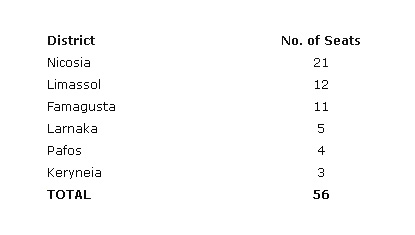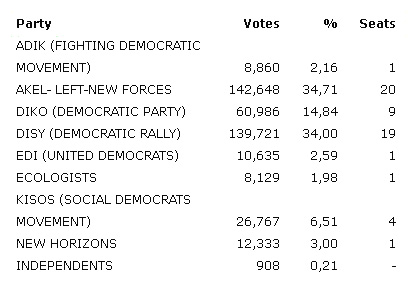The Legislative Power of the Republic is exercised by the House of Representatives in all matters.
Term of Office - The term of office of the House of Representatives is five years. A general election must be held on the second Sunday of the month immediately preceding the month in which the term of office of the outgoing House expires. The outgoing House continues in office until the newly elected House assumes office, but during this time the outgoing House does not have the power to make any laws or to take any decision on any matter, except in urgent and exceptional unforeseen circumstances.
Seats - Following a constitutional amendment in 1985, the House has 80 seats - 56 for Greek Cypriot and 24 for Turkish Cypriot Deputies - with Deputies elected by universal suffrage of adults over the age of 18. Direct and secret ballots are held on the same day for both communities. However, since 1964, Turkish Cypriot members have not attended the House and no elections have been held among the Turkish Cypriot community in accordance with the Republic's constitution. Despite this anomaly, the House has kept vacant the seats allocated to the Turkish Cypriot community. These seats remain at the disposal of Turkish Cypriot Deputies should they be elected according to the constitutional provisions.
The President of the House is a Greek-Cypriot and is elected by the Representatives elected by the Greek-Cypriot community and a Vice-President is constitutionally provided for to be a Turkish-Cypriot and is elected by the Representatives of the Turkish-Cypriot community. In case of temporary absence of the President or Vice-President of the House, their functions are performed by the eldest Representative of the respective community unless the Representatives of the respective community decide otherwise. The Maronite, Armenian and Latin minorities also elect representatives who attend meetings, though without a right of participation in the deliberations. They are consulted in matters concerning the affairs of their religion groups.
The current electoral law provides for a simple proportional representation system. The number of seats in each constituency is determined by law with constituencies coinciding with administrative districts. Seat allocation for the Greek Cypriot community is as on the table on the right. Each voter can choose a party or an independent candidate, without having the option of selecting candidates from different parties. Seats are distributed according to the electoral strength of each party.

Procedures of the House - Ordinary sessions run from the beginning of September to July the following year. The House is in quorum when at least one- third of the total number of its members is present. The laws and the decisions of the House are passed by simple majority vote of the deputies present.
Parliamentary Committees - The Parliamentary Committees generally correspond to the Ministries of the Government. They have the right to summon any interested party, authority, organization, society, association, trade union, person or corporate body to give information and evidence or to express and explain an opinion or view on any bill or subject under consideration. The decisions of committees are taken by majority.
2001 Parliamentary Elections - Following the Parliamentary Elections of 27 May 2001, the distribution of seats by party was as on the table below.

The new Members of the House elected in June 2001 the General Secretary of AKEL Mr. Demetris Christofias as President of the House of Representatives.
President of the House of Representatives - Demetris Christofias was born in Dikomo, Keryneia, which is now in the area occupied by Turkish troops, on 29 August 1946. At the age of fourteen he became a member of the Pan Cyprian United Student Organization (P.E.O.M.) and in 1964 he became a member of the Progressive Party of the Working People (A.K.E.L.), of the Pan Cyprian Labor Federation (P.E.O.) and of the United Democratic Youth Organization (E.D.O.N.). In 1969, at the 5th Congress of E.D.O.N., he was elected member of the Central Council. From 1969 to 1974 he studied at the Institute of Social Sciences and the Academy of Social Sciences in Moscow (Doctor of Philosophy in History).
In 1974 he returned to Cyprus and was employed by E.D.O.N., where he was elected to the post of the Central Organizing Secretary and in 1977 to the post of the General Secretary. At this post he served until 1987. During this period he was in regular contact and collaboration with international and national youth organizations. In 1976 he was elected member of the Nicosia-Keryneia District Committee of A.K.E.L. In 1982 he was elected member of the Central Committee of the party, in 1986 member of the Political Bureau and in 1987 member of the Secretariat of the Central Committee. Following the death of Ezekias Papaioannou, A.K.E.L.’s General Secretary, on 10 April 1988, he was appointed Acting General Secretary by the Political Bureau of the party.
On 22 April 1988 the plenum of the Central Committee elected him to the post of the General Secretary of the party’s Central Committee, a post to which he was re-elected three more times (1990, 1996 and 2000). At the parliamentary elections on 19 May 1991 he was elected Member of the House of Representatives standing as an A.K.E.L. - Left - New Forces party candidate in the Keryneia constituency, an office to which he was re-elected at the subsequent parliamentary elections on 26 May 1996 and 27 May 2001.On 7 June 2001 he was elected President of the House of Representatives for the Eighth Term of Office.
He is chairman ex officio of the Standing Parliamentary Committee on Selection. He is also president of the executive committees of the Cyprus groups to the Inter-Parliamentary Union (I-P.U.) and to the Commonwealth Parliamentary Association (C.P.A.). He is married and has two daughters and a son.
Source: Press And Information Office, Republic Of Cyprus, 2005